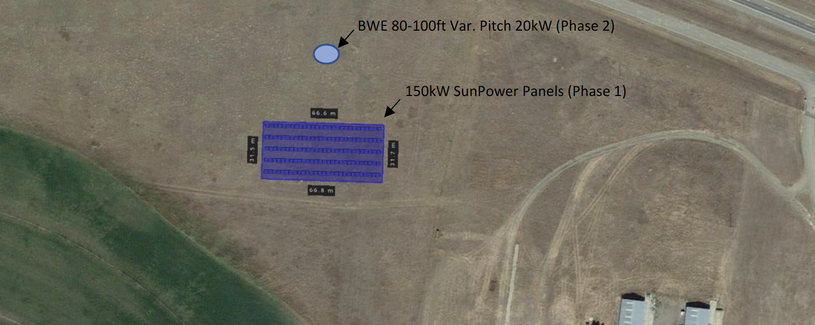Yale Students Design an Off-Grid Renewable Energy System for a Montana Ranch
Students modeled an affordable, 100% off-grid wind-solar-storage system for The Producer Partnership

When the COVID-19 pandemic struck Southwest Montana, the resulting economic downturn caused thousands of Montanans to go hungry. Fifth-generation rancher Matt Pierson stepped up to serve his community. Pierson started The Producer Partnership (TPP) with the goal of providing Montana-raised burger to all Montana food banks by asking his neighbors to donate spare cattle, which were then processed out-of-state due to the dearth of Montana-based USDA-inspected facilities. Despite the expense and effort of the initial processing logistics, TPP has distributed over 100,000 pounds of local burger to Montana food banks, and ranchers receive tax benefits for their donations.
To achieve long-term mission viability, TPP installed a modular meat processing facility on the Pierson ranch in 2022 – Montana’s first federally inspected, nonprofit facility. However, Pierson had limited options for supplying energy to the new processing facility. The local utility company, NorthWestern Energy, allowed Pierson to interconnect to its natural gas system but not its electrical distribution line, due to his remote location. Pierson could have used his own natural gas generator to convert natural gas into electricity, but this option was prohibitively expensive. Further, NorthWestern’s portfolio of fossil-fueled generation did not align with Pierson’s love for the outdoors and care for the earth.
"Throughout this entire process, we have tried to be good stewards of the land and natural resources. Looking for alternative energy sources for the Producer Partnership processing facility was an obvious priority,” said Pierson.
Pierson sought to self-generate renewable electricity from wind, solar, and battery storage and defect from NorthWestern’s service. The Yale team of Ayush Acharya, Caroline Heilbrun, Helena Lam, Steve Yannacone (Yale School of the Environment) and Joe Boland (Yale College) helped Pierson and TPP plan a renewable energy facility to build on Pierson’s spacious ranch in Montana. The team calculated TPP’s energy requirements, researched wind/solar/storage suppliers, simulated the energy system on Pierson’s property, and assessed the capital cost and reliability of different energy system configurations. The Yale team also offered additional pro bono services to TPP, such as zoning advice and a database of available grant funding.
“Our team’s goal was to optimize the off-grid renewable energy system along dimensions of cost and reliability, two factors of vital importance to TPP,” says Caroline Heilbrun.
The team presented TPP with 9 different system configurations with varying sizes of solar, wind, and battery storage. Each configuration had a unique capital cost and number of outage hours per year. The team found 150 kW of solar, 150 kW of battery storage, and 20 kW of wind to minimize cost while meeting TPP’s energy demand with 100% renewable energy.
“Ultimately, we left the final system configuration decision to TPP. How much money are they willing to spend, and how much outage risk are they willing to assume?” says Heilbrun.
TPP’s renewable energy-powered meat processing plant is an exemplar that can be replicated in other locations across the world. A full copy of the Yale team's analysis can be found here.
